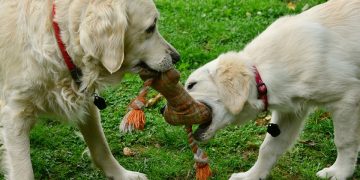Unleashing Harmony: A Guide to Solving Common Dog Behavior Issues
Dogs are loving pets that bring joy and happiness to our lives. However, they can also exhibit behavior issues that can be challenging to deal with. From excessive barking to aggression, these behaviors can disrupt the harmony in your home. In this guide, we will explore common dog behavior issues and provide effective solutions to help you unleash harmony with your furry friend.
Understanding Common Dog Behavior Issues
Before we can address and solve behavior issues in dogs, it is essential to understand the root causes of these behaviors. Some common dog behavior issues include:
1. Excessive Barking
Dogs bark for various reasons, including boredom, anxiety, territorial behavior, or seeking attention. Excessive barking can be annoying and disruptive, but there are ways to address this behavior.
2. Aggression
Aggression in dogs can stem from fear, territorial behavior, or past trauma. It is crucial to address aggression in dogs to prevent any potential harm to humans or other animals.
3. Separation Anxiety
Dogs can experience separation anxiety when left alone, leading to destructive behavior and excessive barking. Understanding and addressing separation anxiety is essential for the well-being of your dog.
4. Destructive Chewing
Dogs may engage in destructive chewing behavior due to boredom, teething, or anxiety. Providing appropriate chew toys and addressing underlying issues can help curb this behavior.
Effective Solutions to Common Dog Behavior Issues
Now that we have identified common behavior issues in dogs, let’s explore effective solutions to address these problems and unleash harmony with your furry friend.
1. Excessive Barking
To address excessive barking, it is essential to understand the root cause of the behavior. Providing mental stimulation, exercise, and training can help reduce excessive barking. Positive reinforcement techniques can also be used to reward quiet behavior.
2. Aggression
Addressing aggression in dogs requires patience, training, and understanding. Consulting with a professional dog trainer or behaviorist can help identify the triggers of aggression and develop a behavior modification plan. It is essential to create a safe environment for your dog and others to prevent any potential harm.
3. Separation Anxiety
To address separation anxiety, gradually desensitize your dog to being alone and create a safe and comfortable space for them. Providing interactive toys, leaving comforting items with your dog, and practicing short absences can help reduce separation anxiety. Consulting with a veterinarian or behaviorist can also provide additional support and guidance.
4. Destructive Chewing
To address destructive chewing, provide appropriate chew toys and outlets for your dog’s natural chewing behavior. Engage in regular exercise and playtime to prevent boredom and anxiety. Supervise your dog when they are left alone and create a dog-friendly environment to discourage destructive chewing behavior.
Common Questions About Dog Behavior Issues
As a dog owner, you may have questions about common behavior issues in dogs. Here are some common questions and answers to help you better understand and address these problems.
1. Why is my dog barking excessively?
Dogs may bark excessively due to boredom, anxiety, territorial behavior, or seeking attention. Identifying the root cause of your dog’s excessive barking can help you find effective solutions to address this behavior.
2. How can I address aggression in my dog?
Addressing aggression in dogs requires patience, training, and understanding. Consulting with a professional dog trainer or behaviorist can help develop a behavior modification plan to address aggression. It is essential to create a safe environment for your dog and others to prevent any potential harm.
3. What can I do to help my dog with separation anxiety?
To help your dog with separation anxiety, gradually desensitize them to being alone, provide interactive toys, and create a safe and comfortable space for them. Consult with a veterinarian or behaviorist for additional support and guidance in addressing separation anxiety.
4. How can I prevent my dog from engaging in destructive chewing?
To prevent destructive chewing behavior, provide appropriate chew toys and outlets for your dog’s natural chewing behavior. Engage in regular exercise and playtime to prevent boredom and anxiety. Supervise your dog when they are left alone and create a dog-friendly environment to discourage destructive chewing behavior.
Conclusion
Unleashing harmony with your dog involves understanding common behavior issues and implementing effective solutions to address these problems. By identifying the root causes of behavior issues and providing appropriate training, exercise, and enrichment, you can create a harmonious relationship with your furry friend. Consult with professionals, such as dog trainers and behaviorists, for additional support and guidance in addressing behavior issues. Together, you can create a happy and harmonious environment for you and your beloved canine companion.














































